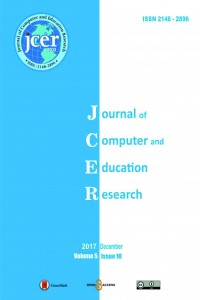Determination of the Relationship Between Information Technology, Student Emotions and Science Literacy
Abstract
In this study, it is aimed to determine the
relationship between student characteristics related to information technology,
the emotions of students and science literacy.
Descriptive research model was used. The sample of the study consists of
5895 15-year old students in Turkey. As a research instrument, the researchers
used the results of cognitive tests utilized by PISA in 2015 to assess
students’ science literacy skills. In this study, Turkish students are divided
into 2 groups. One of these groups who respond all questions about student
characteristics (High Emotional Intelligence) and another who does not respond
all questions about them (Low Emotional Intelligence). It was found that the
students with higher emotional intelligence have higher science literacy. The
results show that the emotions of the students, the information technology that
students have at home and the increase the number of this technology positively
affect higher science literacy.
References
- Akgündüz, D. ve Ertepınar, H. (2015). Stem Eğitimi Türkiye Raporu "Günün Modası mı Yoksa Gereksinim mi?", İstanbul Aydın Üniversitesi STEM Merkezi ve Eğitim Fakültesi.
- Arlı, D., Altunay, E. ve Yalçınkaya, M. (2011). Öğretmen Adaylarında Duygusal Zekâ, Problem Çözme ve Akademik Başarı İlişkisi, Akademik Bakış Dergisi, Sayı:25.
- Baş, G. (2010). İngilizce Dersinde Çoklu Zekâ Yaklaşımının Öğrencilerin Akademik Başarılarına Ve Derse Yönelik Tutum Düzeylerine Katkıları, e-Journal of New World Sciences Academy, Volume: 5, Number: 2, Article Number: 1C0138.
- Büyükalan Filiz, S. and Kaya, V. H. (2013). Examine the Relationship Between the Curriculum of Science and Technology Course in Elementary Education and the Curriculum of Undergraduate and Graduate Programs of Science Teacher Education in Terms of Philosophy, Goal and Content., Journal of Turkish Educatinal Science, 11 (2), 185-208.
- Delen, E. ve Bulut, O. (2011). The Relationship Between Students’ Exposure To Technology and Their Achievement In Science and Math, TOJET: The Turkish Online Journal of Educational Technology, volume 10 Issue 3
- EBA. (2016). Eğitim Bilişim Ağı, Erişim Adresi: http://www.eba.gov.tr/hakkimizda, Erişim Tarihi: 6.01.2016, 11.48.
- Ege, B. (2014). 4. Sanayi Devrimi Kapıda mı?, Bilim ve Teknik Dergisi, Mayıs, 2014 Sayısı, Sayfa 26-29.
- Ergene, T. (2011). Lise Öğrencilerinin Sınav Kaygısı, Çalışma Alışkanlıkları, Başarı Güdüsü ve Akademik Performans Düzeyleri Arasındaki İlişkilerin İncelenmesi, Eğitim ve Bilim Dergisi, Cilt 36, Sayı 160.
- Erkuş, A. (2015). Düşünce Yazısı-Opınıon Paper “Nitel” ve Türevleri (“Alternatif ölçme”, “Çoklu” ve “Duygusal zekâ”): Ne, Niçin ve Nereye Doğru?, İlköğretim Online, 14(3), dy:1-17.
- Godek Altuk, Y., Kaya, V. H., and Bahceci, D. (2015), The Relationship Between Primary School Students’ Scientific Literacy Levels and Scientific Process Skills, Cypriot Journal of Educational Sciences, 10(1), 03-11.
Duygusal Zekânın Işığında Bilişim Teknolojisi ve Öğrenci Duygularının Fen Bilimleri Okuryazarlığı ile İlişkisinin Belirlenmesi
Abstract
Bu çalışmanın amacı, duygusal zekanın ışığında
bilişim teknolojisi ve öğrenci duyguları ile fen bilimleri okuryazarlığı
arasında anlamlı bir farklılık olup olmadığının belirlenmesidir. Bu araştırmada betimsel araştırma modeli
kullanılmıştır. Araştırmanın örneklemini 15 yaşındaki 5895 Türk öğrencisi
oluşturmaktadır. Bu araştırmada PISA 2015 uygulamaları kapsamında toplanmış
olan 15 yaş grubundaki öğrencilere ait öğrenci anketleri ile fen okuryazarlığı
testlerinden elde edilen verilerden yararlanılacaktır. Bu çalışmada PISA
2015’de yer alan öğrencilerin kişisel özelliklerin tamamına cevap verenler
(Duygusal Zekası Yüksek) ve cevap vermeyenler (Duygusal Zekası Düşük) olmak
üzere 2 gruba ayrılmıştır. 2 grup için de belirlenen bilişim teknolojileri ile
ilgili öğrenci özelliklerinin fen bilimleri okuryazarlığına etkisi
belirlenmiştir. Duygusal Zekası yüksek
bireylerin fen bilimleri okuryazarlığının daha fazla olduğu sonucuna ulaşılmıştır.
Öğrencilerin duyguları, evde bilişim teknolojisine sahip olması ve bunların
niceliksel olarak artışı fen bilimleri okuryazarlığını olumlu etkilediği
sonucuna ulaşılmıştır.
References
- Akgündüz, D. ve Ertepınar, H. (2015). Stem Eğitimi Türkiye Raporu "Günün Modası mı Yoksa Gereksinim mi?", İstanbul Aydın Üniversitesi STEM Merkezi ve Eğitim Fakültesi.
- Arlı, D., Altunay, E. ve Yalçınkaya, M. (2011). Öğretmen Adaylarında Duygusal Zekâ, Problem Çözme ve Akademik Başarı İlişkisi, Akademik Bakış Dergisi, Sayı:25.
- Baş, G. (2010). İngilizce Dersinde Çoklu Zekâ Yaklaşımının Öğrencilerin Akademik Başarılarına Ve Derse Yönelik Tutum Düzeylerine Katkıları, e-Journal of New World Sciences Academy, Volume: 5, Number: 2, Article Number: 1C0138.
- Büyükalan Filiz, S. and Kaya, V. H. (2013). Examine the Relationship Between the Curriculum of Science and Technology Course in Elementary Education and the Curriculum of Undergraduate and Graduate Programs of Science Teacher Education in Terms of Philosophy, Goal and Content., Journal of Turkish Educatinal Science, 11 (2), 185-208.
- Delen, E. ve Bulut, O. (2011). The Relationship Between Students’ Exposure To Technology and Their Achievement In Science and Math, TOJET: The Turkish Online Journal of Educational Technology, volume 10 Issue 3
- EBA. (2016). Eğitim Bilişim Ağı, Erişim Adresi: http://www.eba.gov.tr/hakkimizda, Erişim Tarihi: 6.01.2016, 11.48.
- Ege, B. (2014). 4. Sanayi Devrimi Kapıda mı?, Bilim ve Teknik Dergisi, Mayıs, 2014 Sayısı, Sayfa 26-29.
- Ergene, T. (2011). Lise Öğrencilerinin Sınav Kaygısı, Çalışma Alışkanlıkları, Başarı Güdüsü ve Akademik Performans Düzeyleri Arasındaki İlişkilerin İncelenmesi, Eğitim ve Bilim Dergisi, Cilt 36, Sayı 160.
- Erkuş, A. (2015). Düşünce Yazısı-Opınıon Paper “Nitel” ve Türevleri (“Alternatif ölçme”, “Çoklu” ve “Duygusal zekâ”): Ne, Niçin ve Nereye Doğru?, İlköğretim Online, 14(3), dy:1-17.
- Godek Altuk, Y., Kaya, V. H., and Bahceci, D. (2015), The Relationship Between Primary School Students’ Scientific Literacy Levels and Scientific Process Skills, Cypriot Journal of Educational Sciences, 10(1), 03-11.
Details
| Journal Section | Research Article |
|---|---|
| Authors | |
| Publication Date | December 3, 2017 |
| Submission Date | January 1, 2017 |
| Acceptance Date | July 28, 2017 |
| Published in Issue | Year 2017 Volume: 5 Issue: 10 |


